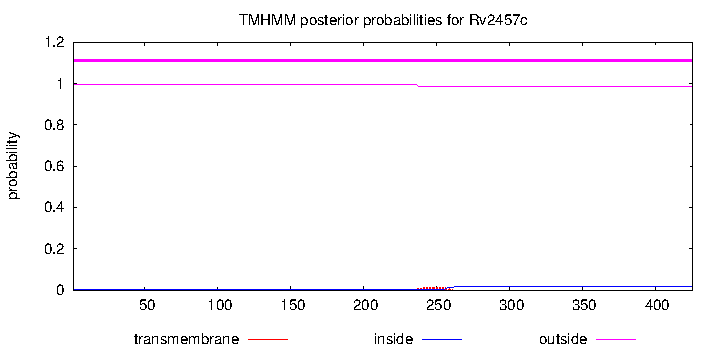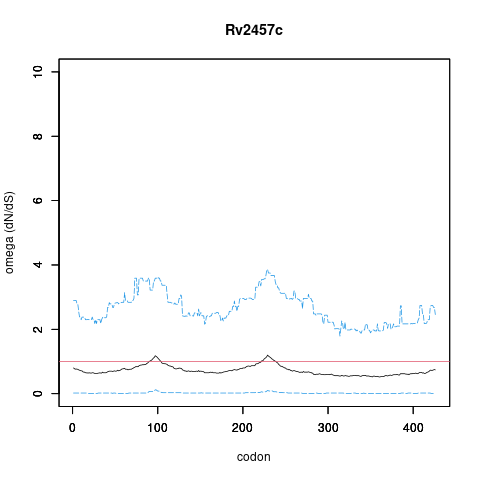Rv2457c (clpX)
Current annotations:
TBCAP: (community-based annotations - see table at bottom of page )
TBDB: ATP-dependent Clp protease ATP-binding subunit ClpX
REFSEQ: ATP-dependent protease ATP-binding subunit ClpX
PATRIC: ATP-dependent Clp protease ATP-binding subunit ClpX
TUBERCULIST: Probable ATP-dependent CLP protease ATP-binding subunit ClpX
NCBI: Probable ATP-dependent CLP protease ATP-binding subunit ClpX
updated information (H37Rv4):
gene name: clpX
function:
reference:
Type: Not Target
Start: 2758208
End: 2759488
Operon:
Trans-membrane region:
Role: II.B.3 - Proteins, peptides and glycopeptides
GO terms:
Reaction(s) (based on iSM810 metabolic model):
Gene Expression Profile Gene Modules Orthologs among selected mycobacteria Protein structure:
Search for Homologs in PDB Top 10 Homologs in PDB (as of Nov 2020): PDB aa ident species PDB title 2DS8 76% Escherichia coli Structure of the ZBD-XB complex 2DS6 76% Escherichia coli Structure of the ZBD in the tetragonal crystal form 2DS5 76% Escherichia coli Structure of the ZBD in the orthorhomibic crystal from 1OVX 76% Escherichia coli NMR structure of the E. coli ClpX chaperone zinc binding domain dimer 2DS7 73% Escherichia coli Structure of the ZBD in the hexagonal crystal form 6SFW 66% Listeria monocytogenes Cryo-EM Structure of the ClpX component of the ClpXP1/2 degradation machinery. 6WSG 62% Escherichia coli ClpX-ClpP complex bound to ssrA-tagged GFP, intermediate complex 6WRF 62% Escherichia coli (strain K12) ClpX-ClpP complex bound to GFP-ssrA, recognition complex 6WR2 62% Escherichia coli (strain K12) ClpP and ClpX IGF loop in ClpX-ClpP complex bound to ssrA tagged GFP 4I9K 62% Escherichia coli Crystal structure of symmetric W-W-W ClpX Hexamer
Links to additional information on clpX:
Amino Acid Sequence
MARIGDGGDLLKCSFCGKSQKQVKKLIAGPGVYICDECIDLCNEIIEEELADADDVKLDELPKPAEIREFLEGYVIGQDTAKRTLAVAVYNHYKRIQAGE
KGRDSRCEPVELTKSNILMLGPTGCGKTYLAQTLAKMLNVPFAIADATALTEAGYVGEDVENILLKLIQAADYDVKRAETGIIYIDEVDKIARKSENPSI
TRDVSGEGVQQALLKILEGTQASVPPQGGRKHPHQEFIQIDTTNVLFIVAGAFAGLEKIIYERVGKRGLGFGAEVRSKAEIDTTDHFADVMPEDLIKFGL
IPEFIGRLPVVASVTNLDKESLVKILSEPKNALVKQYIRLFEMDGVELEFTDDALEAIADQAIHRGTGARGLRAIMEEVLLPVMYDIPSRDDVAKVVVTK
ETVQDNVLPTIVPRKPSRSERRDKSA
(
Nucleotide sequence available on
KEGG )
Additional Information
Analysis of Positive Selection in Clinical Isolates
*new*
Analysis of dN/dS (omega) in two collections of Mtb clinical isolates using GenomegaMap (Window model) (see description of methods )
Moldova: 2,057 clinical isolates
global set: 5,195 clinical isolates from 15 other countries
In the omega plots, the black line shows the mean estimate of omega (dN/dS) at each codon, and the blue lines are the bounds for the 95% credible interval (95%CI, from MCMC sampling).
A gene is under significant positive selection if the lower-bound of the 95%CI of omega (lower blue line) exceeds 1.0 at any codon.
Moldova (2,057) global set (5,195)
under significant positive selection? NO NO
omega peak height (95%CI lower bound) 1.16 (0.12) 1.44 (0.45)
codons under selection
omega plots
genetic variants* link link
statistics at each codon link link
* example format for variants: "D27 (GAC): D27H (CAC,11)" means "Asp27 (native codon GAC) mutated to His (codon CAC) in 11 isolates"
MtbTnDB - interactive tool for exploring a database of published TnSeq datasets for Mtb
TnSeqCorr
Rv2457c/clpX,
gene len: 1280 bp, num TA sites: 20
condition dataset call medium method notes
in-vitro DeJesus 2017 mBio essential 7H9 HMM fully saturated, 14 TnSeq libraries combined
in-vitro Sassetti 2003 Mol Micro essential 7H9 TRASH essential if hybridization ratio<0.2
in-vivo (mice) Sassetti 2003 PNAS non-essential BL6 mice TRASH essential if hybridization ratio<0.4, min over 4 timepoints (1-8 weeks)
in-vitro (glycerol) Griffin 2011 PPath essential M9 minimal+glycerol Gumbel 2 replicates; Padj<0.05
in-vitro (cholesterol) Griffin 2011 PPath essential M9 minimal+cholesterol Gumbel 3 replicates; Padj<0.05
differentially essential in cholesterol Griffin 2011 PPath NO (LFC=0.0) cholesterol vs glycerol resampling-SR YES if Padj<0.05, else not significant; LFC<0 means less insertions/more essential in cholesterol
in-vitro Smith 2022 eLife essential 7H9 HMM 6 replicates (raw data in Subramaniam 2017, PMID 31752678)
in-vivo (mice) Smith 2022 eLife essential BL6 mice HMM 6 replicates (raw data in Subramaniam 2017, PMID 31752678)
differentially essential in mice Smith 2022 eLife NO (LFC=0.0) in-vivo vs in-vitro ZINB YES if Padj<0.05, else not significant; LFC<0 means less insertions/more essential in mice
in-vitro (minimal) Minato 2019 mSys essential minimal medium HMM
in-vitro (YM rich medium) Minato 2019 mSys essential YM rich medium HMM 7H9 supplemented with ~20 metabolites (amino acids, cofactors)
differentially essential in YM rich medium Minato 2019 mSys NO (LFC=0.0) YM rich vs minimal medium resampling
TnSeq Data No data currently available.
No TnSeq data currently available for this Target.
RNASeq Data No data currently available.
No RNA-Seq data currently available for this Target.
Metabolomic Profiles No data currently available.
No Metabolomic data currently available for this Target.
Proteomic Data No data currently available.
No Proteomic data currently available for this Target.
Regulatory Relationships from Systems Biology
BioCyc
Gene interactions based on ChIPSeq and Transcription Factor Over-Expression (TFOE) (Systems Biology )
NOTE:
Green edges represent the connected genes being classified as differentially essential as a result of the middle gene being knocked out. These interactions are inferred based on RNASeq.
Interactions based on ChIPSeq data
RNA processing and modification
Energy production and conversion
Chromatin structure and dynamics
Amino acid transport and metabolism
Cell cycle control, cell division, chromosome partitioning
Carbohydrate transport and metabolism
Nucleotide transport and metabolism
Lipid transport and metabolism
Coenzyme transport and metabolism
Translation, ribosomal structure and biogenesis
Cell wall/membrane/envelope biogenesis
Replication, recombination and repair
Posttranslational modification, protein turnover, chaperones
Secondary metabolites biosynthesis, transport and catabolism
Inorganic ion transport and metabolism
General function prediction only
Intracellular trafficking, secretion, and vesicular transport
Signal transduction mechanisms
Differentially expressed as result of RNASeq in glycerol environment (Only top 20 genes shown sorted by log fold change with p_adj 0.05).
Conditionally essential as result of TNSeq (Only top 20 genes shown sorted by log fold change with p_adj 0.05).
Binds To:
No bindings to other targets were found.
Bound By:
No bindings from other targets were found.
Binds To:
No bindings to other targets were found.
Bound By:
No bindings to other targets were found.
Upregulates:
Does not upregulate other genes.
Upregulated by:
Not upregulated by other genes.
Downregulates:
Does not downregulate other genes.
Downregulated by:
Not downregulated by other genes.
Property Value Creator Evidence PMID Comment
Interaction PhysicalInteraction Rv2461c akankshajain.21 IDA Structural analysisauthors,A. Gribun,MS. Kimber,R. Ching,R. Sprangers,KM. Fiebig,WA. Houry The ClpP double ring tetradecameric protease exhibits plastic ring-ring interactions, and the N termini of its subunits form flexible loops that are essential for ClpXP and ClpAP complex formation. J. Biol. Chem. 2005
Interaction PhysicalInteraction Rv2461c akankshajain.21 IDA Structural analysisAK. Gupta, VM. Katoch et al. Microarray analysis of efflux pump genes in multidrug-resistant Mycobacterium tuberculosis during stress induced by common anti-tuberculous drugs. Microb. Drug Resist. 2010
Interaction PhysicalInteraction Rv2461c akankshajain.21 IDA Structural analysisH. Ingvarsson, MJ. Mat et al. Insights into the inter-ring plasticity of caseinolytic proteases from the X-ray structure of Mycobacterium tuberculosis ClpP1. Acta Crystallogr. D Biol. Crystallogr. 2007
Interaction Regulatory Rv2461c richasinha4u IDA Spectrophotometric Analysisauthors,S. Gottesman,WP. Clark,MR. Maurizi The ATP-dependent Clp protease of Escherichia coli. Sequence of clpA and identification of a Clp-specific substrate. J. Biol. Chem. 1990
Interaction Regulatory Rv2461c richasinha4u IDA Spectrophotometric Analysisauthors,AY. Yu,WA. Houry ClpP: a distinctive family of cylindrical energy-dependent serine proteases. FEBS Lett. 2007
Interaction Regulatory Rv2461c richasinha4u IDA Structural Analysisauthors,MR. Maurizi,WP. Clark,Y. Katayama,S. Rudikoff,J. Pumphrey,B. Bowers,S. Gottesman Sequence and structure of Clp P, the proteolytic component of the ATP-dependent Clp protease of Escherichia coli. J. Biol. Chem. 1990
Interaction Regulatory Rv2461c richasinha4u IDA Structural Analysisauthors,S. Gottesman,WP. Clark,MR. Maurizi The ATP-dependent Clp protease of Escherichia coli. Sequence of clpA and identification of a Clp-specific substrate. J. Biol. Chem. 1990
Interaction Regulatory Rv2461c richasinha4u IDA Structural Analysisauthors,AY. Yu,WA. Houry ClpP: a distinctive family of cylindrical energy-dependent serine proteases. FEBS Lett. 2007
Interaction PhysicalInteraction Rv2460c akankshajain.21 IDA Structural analysisauthors,A. Gribun,MS. Kimber,R. Ching,R. Sprangers,KM. Fiebig,WA. Houry The ClpP double ring tetradecameric protease exhibits plastic ring-ring interactions, and the N termini of its subunits form flexible loops that are essential for ClpXP and ClpAP complex formation. J. Biol. Chem. 2005
Interaction Regulatory Rv2461c richasinha4u IDA Spectrophotometric Analysisauthors,MR. Maurizi,WP. Clark,Y. Katayama,S. Rudikoff,J. Pumphrey,B. Bowers,S. Gottesman Sequence and structure of Clp P, the proteolytic component of the ATP-dependent Clp protease of Escherichia coli. J. Biol. Chem. 1990
Citation Structure-function analysis of the zinc-binding region of the Clpx molecular chaperone. authors,B. Banecki,A. Wawrzynow,J. Puzewicz,C. Georgopoulos,M. Zylicz J. Biol. Chem. 2001 richasinha4u IDA 11278349 Structural Analysis
Interaction PhysicalInteraction Rv2461c richasinha4u IDA Structural Analysisauthors,B. Banecki,A. Wawrzynow,J. Puzewicz,C. Georgopoulos,M. Zylicz Structure-function analysis of the zinc-binding region of the Clpx molecular chaperone. J. Biol. Chem. 2001
Citation Solution structure of the dimeric zinc binding domain of the chaperone ClpX. authors,LW. Donaldson,U. Wojtyra,WA. Houry J. Biol. Chem. 2003 richasinha4u IDA 14525985 Structural Analysis
Interaction PhysicalInteraction Rv2461c richasinha4u IDA Structural Analysisauthors,LW. Donaldson,U. Wojtyra,WA. Houry Solution structure of the dimeric zinc binding domain of the chaperone ClpX. J. Biol. Chem. 2003
Citation ClpP: a distinctive family of cylindrical energy-dependent serine proteases. authors,AY. Yu,WA. Houry FEBS Lett. 2007 richasinha4u IDA 17499722 Structural Analysis
Interaction PhysicalInteraction Rv2461c richasinha4u IDA Structural Analysisauthors,AY. Yu,WA. Houry ClpP: a distinctive family of cylindrical energy-dependent serine proteases. FEBS Lett. 2007
Interaction PhysicalInteraction Rv2460c akankshajain.21 IDA Structural analysisAK. Gupta, VM. Katoch et al. Microarray analysis of efflux pump genes in multidrug-resistant Mycobacterium tuberculosis during stress induced by common anti-tuberculous drugs. Microb. Drug Resist. 2010
Citation The ClpP double ring tetradecameric protease exhibits plastic ring-ring interactions, and the N termini of its subunits form flexible loops that are essential for ClpXP and ClpAP complex formation. authors,A. Gribun,MS. Kimber,R. Ching,R. Sprangers,KM. Fiebig,WA. Houry J. Biol. Chem. 2005 vmevada102 ISO 15701650 Structural analysis
Interaction PhysicalInteraction Rv2460c vmevada102 ISO Structural analysisauthors,A. Gribun,MS. Kimber,R. Ching,R. Sprangers,KM. Fiebig,WA. Houry The ClpP double ring tetradecameric protease exhibits plastic ring-ring interactions, and the N termini of its subunits form flexible loops that are essential for ClpXP and ClpAP complex formation. J. Biol. Chem. 2005
Interaction PhysicalInteraction Rv2461c vmevada102 ISO Structural analysisauthors,A. Gribun,MS. Kimber,R. Ching,R. Sprangers,KM. Fiebig,WA. Houry The ClpP double ring tetradecameric protease exhibits plastic ring-ring interactions, and the N termini of its subunits form flexible loops that are essential for ClpXP and ClpAP complex formation. J. Biol. Chem. 2005
Citation Structure-function analysis of the zinc-binding region of the Clpx molecular chaperone. authors,B. Banecki,A. Wawrzynow,J. Puzewicz,C. Georgopoulos,M. Zylicz J. Biol. Chem. 2001 richasinha4u IDA 11278349 Spectrophotometric Analysis
Interaction PhysicalInteraction Rv2461c richasinha4u IDA Spectrophotometric Analysisauthors,B. Banecki,A. Wawrzynow,J. Puzewicz,C. Georgopoulos,M. Zylicz Structure-function analysis of the zinc-binding region of the Clpx molecular chaperone. J. Biol. Chem. 2001
Citation Solution structure of the dimeric zinc binding domain of the chaperone ClpX. authors,LW. Donaldson,U. Wojtyra,WA. Houry J. Biol. Chem. 2003 richasinha4u IDA 14525985 Spectrophotometric Analysis
Interaction PhysicalInteraction Rv2461c richasinha4u IDA Spectrophotometric Analysisauthors,LW. Donaldson,U. Wojtyra,WA. Houry Solution structure of the dimeric zinc binding domain of the chaperone ClpX. J. Biol. Chem. 2003
Citation ClpP: a distinctive family of cylindrical energy-dependent serine proteases. authors,AY. Yu,WA. Houry FEBS Lett. 2007 richasinha4u IDA 17499722 Spectrophotometric Analysis
Interaction PhysicalInteraction Rv2461c richasinha4u IDA Spectrophotometric Analysisauthors,AY. Yu,WA. Houry ClpP: a distinctive family of cylindrical energy-dependent serine proteases. FEBS Lett. 2007
Citation Microarray analysis of efflux pump genes in multidrug-resistant Mycobacterium tuberculosis during stress induced by common anti-tuberculous drugs. AK. Gupta, VM. Katoch et al. Microb. Drug Resist. 2010 vmevada102 ISO 20001742 Structural analysis
Interaction PhysicalInteraction Rv2460c vmevada102 ISO Structural analysisAK. Gupta, VM. Katoch et al. Microarray analysis of efflux pump genes in multidrug-resistant Mycobacterium tuberculosis during stress induced by common anti-tuberculous drugs. Microb. Drug Resist. 2010
Interaction PhysicalInteraction Rv2461c vmevada102 ISO Structural analysisAK. Gupta, VM. Katoch et al. Microarray analysis of efflux pump genes in multidrug-resistant Mycobacterium tuberculosis during stress induced by common anti-tuberculous drugs. Microb. Drug Resist. 2010
Interaction RegulatedBy Rv1221 yamir.moreno IEP Microarrays. mRNA levels of regulated element measured and compared between wild-type and trans-element mutation (knockout, over expression etc.) performed by using microarray (or macroarray) experiments..R. Manganelli, MI. Voskuil et al. The Mycobacterium tuberculosis ECF sigma factor sigmaE: role in global gene expression and survival in macrophages. Mol. Microbiol. 2001


